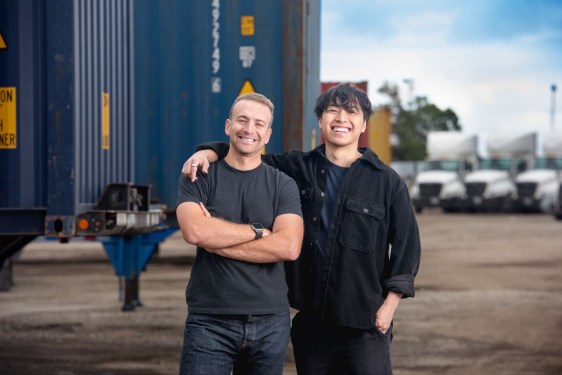Thousands of small trucking companies that help move goods around the United States use a fairly old-school way of doing things, according to Paul Singer. He would know, as he left his product manager job at Uber Freight to start a company called FleetWorks, which he believes will modernize the industry.
Created during Y Combinator’s Summer 2023 batch, FleetWorks has been developing a marketplace that uses artificial intelligence to make faster matches between carrier companies and goods that need to be moved. This frees up more time for workers on both sides of the transaction.
Singer and co-founder Quang Tran, who worked on moonshot projects at Airbnb, see a massive opportunity. They have found serious buy-in, with FleetWorks claiming to have brought more than 10,000 carriers and dozens of brokers, including Singer’s old employer Uber Freight, onto its marketplace in the first six months.
To push things further, FleetWorks has raised 17 million dollars to put towards hiring, commercial expansion, and product development. This includes a newly launched always-on AI dispatcher. The funding includes a 15 million dollar Series A round led by First Round Capital’s Bill Trenchard, who also led Uber’s seed round in 2010. Y Combinator, Saga Ventures, and LFX Venture Partners also participated in the Series A.
Singer explained that they ultimately went with First Round Capital to lead the round because he believes they are the preeminent investor in early stage investing. He said they were one of the few who really understood that FleetWorks was building a marketplace company.
Trenchard, who was also an early investor in Flexport, stated that he believes AI is the best way to manage all of these transactions, especially for small businesses. He said traditional software is just not good at this, as it requires structuring data before you know all the necessary elements and pushes people through a rigid system. He believes AI is more open-ended, allowing for conversations that discover people’s real interests.
A number of startups and established companies are trying to apply AI to shipping and logistics. Oway, another Y Combinator-backed startup, is working on a sort of Uber for freight, focusing on packing trucks that would otherwise be half-empty. Uber Freight is getting its Fortune 500 customers to use a customized large language model to sort through their data. Flexport, which deals more with global shipping, rolled out a suite of AI tools for its customers in February.
With FleetWorks, Singer and Tran have focused on the communication that drives the trucking world. Singer said he tries to understand how each carrier wants to communicate, offering a mix of off-the-shelf and custom-developed voice and text models. He asks if they want a phone call, a text message, or to use a portal to talk to an agent. From there, FleetWorks’ AI agents help match goods with truckers, finding out where the truckers will be, when they will be there, and what price they need to move the cargo.
The AI can also handle more nuanced but important details, such as whether a driver is heading to a facility that requires steel-toed boots or if a trucker needs to be home by Friday for family. These are all things carriers and truckers already do, but Singer said it often takes dozens of calls, texts, and emails to complete. For small carrier fleets, which make up the majority of the industry, that time is money.
Singer described freight as a very fluid system on both sides. For brokers, pickup times or prices might change as a load becomes more critical closer to the pickup time. The data both sides collect feeds this AI-powered system, and when a match is detected, FleetWorks can insert one of its carriers directly into the broker’s system.
This is a lot of detail and nuance for AI software to handle. To cut down on errors, Singer said FleetWorks relies on multiple models in the background, each designed for specialized tasks. The always-on dispatcher then pulls data from those discrete agents.
Singer emphasized that it is not just about the technology, a lesson he learned from his time at Uber Freight. It is about helping customers through change management, teaching teams how to use the tools, and showing them the opportunities for business impact. He said they have gotten really good at AI implementation in addition to building the core agents.
This approach was a big attractor for Trenchard as well. He said one of the exciting things about AI is that it fits into the behaviors people already have, without requiring them to change how they do business.
While there is a lot of Uber DNA in what FleetWorks is building, Singer is not myopic. He said there is a lot of young software talent who want to work on solving problems in the physical world. In fact, Singer joked that he has already hired some engineers who have not seen the movie Shrek from 2001. He said he never thought he would feel like an old head.

